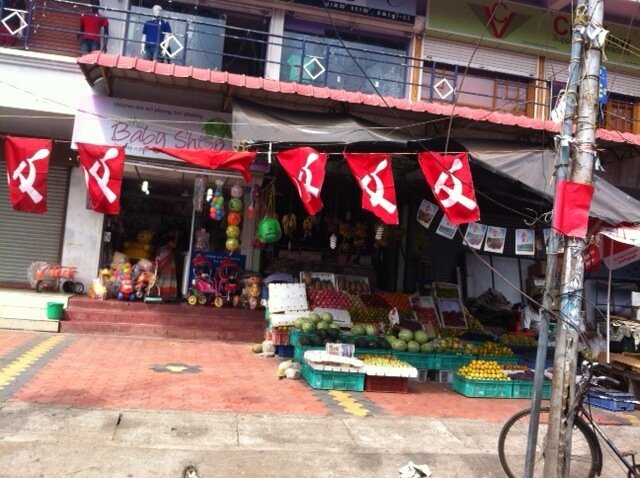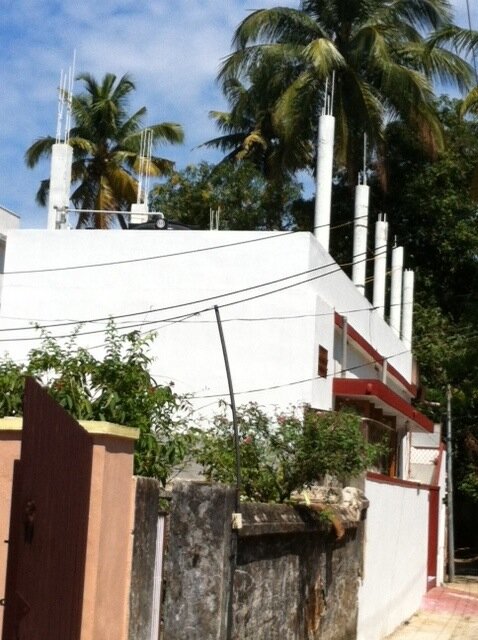David's reflections on Kochi and Varkala
A few parting thoughts on leaving Fort Kochi. They are not unique to Kochi; it's just that Kochi was our entry point into India on this trip so it has refocused us on some striking characteristics of the country that every visitor experiences. First is the trash that Indians drop obliviously whenever and wherever something comes in contact with their hands that they do not want to keep. The trash does not exist here with the same intensity that we remember from the north. But it is everywhere. Thin plastic film shopping bags, empty water bottles, unwanted flip-flops, newspapers, fragments of heavy woven plastic bags for concrete, and every other kind of trash. It fills our vision no matter where we look. And it made clear that we are products of our culture; at one point we realized that we were carrying around all day the trash that we were generating. For hours I would see on my index finger the blue or white plastic ring that would otherwise fall to the ground when I opened a new bottle of water. And at the end of the day I found in my pocket the plastic shrink-wrap that had covered the cap. We were simply not capable of dropping our trash. How strange and foreign it made us feel when a billion people around us were dropping theirs without a thought.But then again, I remember reading a few years ago about protest demonstrations by tens of thousands of garbage scavengers when the city of New Delhi threatened their livelihoods and lives by creating a modern system of garbage collection and disposal.The second thought is about the traffic. Again, it does not have the same intensity as we remember from the north, but it is still insane. In essence, everything is negotiable. Does this road have any shoulders? Does it have any traffic lanes? If so, do the shoulders and various lanes run alongside each other, or do they all sit one on top of the other? And does the traffic on the shoulder or in any given lane go in this direction or that direction? On an ostensibly two-lane road, ostensibly with no shoulders, should our taxi pass a tuk tuk at the same time that the tuk tuk is passing a scooter, at the same time the scooter is passing a woman walking on the edge of the road with a baby in her arms, at the same time that a bus is trying to pass our taxi, at the same time that a precariously overloaded lorry lumbers into the road in front of us from a side street without a moment's hesitation, at the same time that oncoming traffic is doing all the above, at the same time that every driver on the road is assiduously avoiding any eye contact with the other drivers? The answer to all these questions is the ubiquitous Indian head bobble. Which, depending on context, means "yes" or "no" or "maybe" or "I don't know" or "thank you" or "I acknowledge your existence and the fact that you have uttered some words to me." And in response to all the above questions, the bobble probably has all these meanings at the same time.In spite of all this chaos, I am convinced that we are in the midst of a sophisticated, nuanced choreography. We have seen not one incident of metal-to-metal contact, much less a fender bender. The drivers have an exquisite sense of where the corners and edges of their vehicles are. And they must be negotiating with each other, telepathically, and achieving an instantly achieved resolution. The bad negotiators have long since been pushed off the road, either literally or in the existential sense by succumbing to head-on collisions.And finally, a strange construction technique. Buildings are frequently made of poured concrete with the supporting columns extending up through the roof. This includes single story homes and shops, multi-story office buildings, clinics and the like. The strange technique is shown in the photo below. Rebars are left protruding above the roof line, sticking up from the top of the supporting columns and frames. Sometimes it is just raw uncovered rebars that extend above the roofline. In more expensive construction (as in the photo), the supporting columns themselves extend above the roof line, with the rebars extending upward from the top of the extended supporting columns. All, apparently, to facilitate adding further stories to the original structure in the future. However, the pervasiveness of rusting rebars and crumbling support columns on roof tops suggests that hopes of adding to the original structure are not much more than hyper-optimism. On leaving Kochi for the beach at Varkala and the Kerala backwaters, we had to change our schedule because a two-day country-wide general strike was called, the time in modern India. The issue was inflation, especially the cost of gasoline. Even private-hire drivers would not go out on the roads during the strike for fear that strikers would stone their cars. Kerala is a Communist state (the only one in India, I believe, and the photo below shows that they take their Communism seriously) and enforcement of the strike is particularly strong here. Even to the point that a road block of young men with 3" thick wooden poles stopped our tuk tuk on a back alley in a small neighborhood far from the tourist areas. Luckily we were with our favorite driver, Mujee. He seems to be the most popular young man in town, and after he flashed his smile and had some cheerful banter with the men in the Kerala language of Malayalam, the group waved us on our way down the alley. I sense that we would not have been permitted to continue down the alley if we had a less popular and charming driver. (As an aside, Mujee told us forcefully that he is Communist, as though it is something that he wants every tourist to know, capitalist Americans in particular. I think he was disappointed to learn that we are old fashioned limousine liberals who did not need any indoctrination.)
On leaving Kochi for the beach at Varkala and the Kerala backwaters, we had to change our schedule because a two-day country-wide general strike was called, the time in modern India. The issue was inflation, especially the cost of gasoline. Even private-hire drivers would not go out on the roads during the strike for fear that strikers would stone their cars. Kerala is a Communist state (the only one in India, I believe, and the photo below shows that they take their Communism seriously) and enforcement of the strike is particularly strong here. Even to the point that a road block of young men with 3" thick wooden poles stopped our tuk tuk on a back alley in a small neighborhood far from the tourist areas. Luckily we were with our favorite driver, Mujee. He seems to be the most popular young man in town, and after he flashed his smile and had some cheerful banter with the men in the Kerala language of Malayalam, the group waved us on our way down the alley. I sense that we would not have been permitted to continue down the alley if we had a less popular and charming driver. (As an aside, Mujee told us forcefully that he is Communist, as though it is something that he wants every tourist to know, capitalist Americans in particular. I think he was disappointed to learn that we are old fashioned limousine liberals who did not need any indoctrination.) While on the way to Varkala, we encountered a practice that American trial lawyers would consider nirvana. We were driving slowly through some congestion in a small country village and a man walked into the street as we approached. With clear deliberation he looked away from our car and walked slowly on a path that would put him in front of the car. He continued walking until he allowed himself to come within an inch of being side swiped. Then he feigned being hit by the car, stuck his arm through the driver's door's open window and demanded Rs. 50 as compensation for his injury, the equivalent of less than $1. When he forced our driver to pull over and pay him, I put on my lawyer hat and told the driver to call the police. Both Lora and I had been watching the man carefully as he approached the car and pretended to be hit, so we had two reliable witnesses. The driver looked at me as though I was crazy and reminded me that "this not our area." The Rs. 50 were passed through the open window and the "victim" of the "accident" smiled at us as we drove off. I'm sure that he was already looking for the next private-hire car with a tourist in the back seat.When we arrived in Varkala we decided to buy an unlocked phone and a local SIM card. We asked our tuk tuk driver Mujee to take us to a phone shop and it's lucky he was able to guide us through the process. Before the store would sell me the phone: the man made a photocopy of my passport and of the page containing my Indian visa; he had me fill out a long form that called for our permanent and local residences and other detailed identifying information; he required a passport photo (which by sheer luck I happened to have); he pasted the photo onto the long form; and he had me sign the form in three separate places, one of which had to begin on the paper of the form next to my photo, and then extend across the photo and onto the paper on the far side of the photo. And that was just for the phone. For the SIM card, we had to go down the street to a different shop where the process was repeated. Thankfully for us, the SIM card process did not require another photo. Then we had to activate the phone — but this could be done only after 48 hours, giving the bureaucracy sufficient time to get the paperwork over to the counter-terrorism people. Activation involved calling a special number, giving detailed information to the person on the other end of the line, and then speaking into the phone as that person recorded my voice. It's hard to complain about compulsive protection against terrorism, and just think of the tens of thousands of people for which it provides governmental employment. As for Mujee — we gave him an extra Rs. 100 for guiding us through a process that is impenetrable for any person who does not speak Malayalam or Hindi.
While on the way to Varkala, we encountered a practice that American trial lawyers would consider nirvana. We were driving slowly through some congestion in a small country village and a man walked into the street as we approached. With clear deliberation he looked away from our car and walked slowly on a path that would put him in front of the car. He continued walking until he allowed himself to come within an inch of being side swiped. Then he feigned being hit by the car, stuck his arm through the driver's door's open window and demanded Rs. 50 as compensation for his injury, the equivalent of less than $1. When he forced our driver to pull over and pay him, I put on my lawyer hat and told the driver to call the police. Both Lora and I had been watching the man carefully as he approached the car and pretended to be hit, so we had two reliable witnesses. The driver looked at me as though I was crazy and reminded me that "this not our area." The Rs. 50 were passed through the open window and the "victim" of the "accident" smiled at us as we drove off. I'm sure that he was already looking for the next private-hire car with a tourist in the back seat.When we arrived in Varkala we decided to buy an unlocked phone and a local SIM card. We asked our tuk tuk driver Mujee to take us to a phone shop and it's lucky he was able to guide us through the process. Before the store would sell me the phone: the man made a photocopy of my passport and of the page containing my Indian visa; he had me fill out a long form that called for our permanent and local residences and other detailed identifying information; he required a passport photo (which by sheer luck I happened to have); he pasted the photo onto the long form; and he had me sign the form in three separate places, one of which had to begin on the paper of the form next to my photo, and then extend across the photo and onto the paper on the far side of the photo. And that was just for the phone. For the SIM card, we had to go down the street to a different shop where the process was repeated. Thankfully for us, the SIM card process did not require another photo. Then we had to activate the phone — but this could be done only after 48 hours, giving the bureaucracy sufficient time to get the paperwork over to the counter-terrorism people. Activation involved calling a special number, giving detailed information to the person on the other end of the line, and then speaking into the phone as that person recorded my voice. It's hard to complain about compulsive protection against terrorism, and just think of the tens of thousands of people for which it provides governmental employment. As for Mujee — we gave him an extra Rs. 100 for guiding us through a process that is impenetrable for any person who does not speak Malayalam or Hindi.
